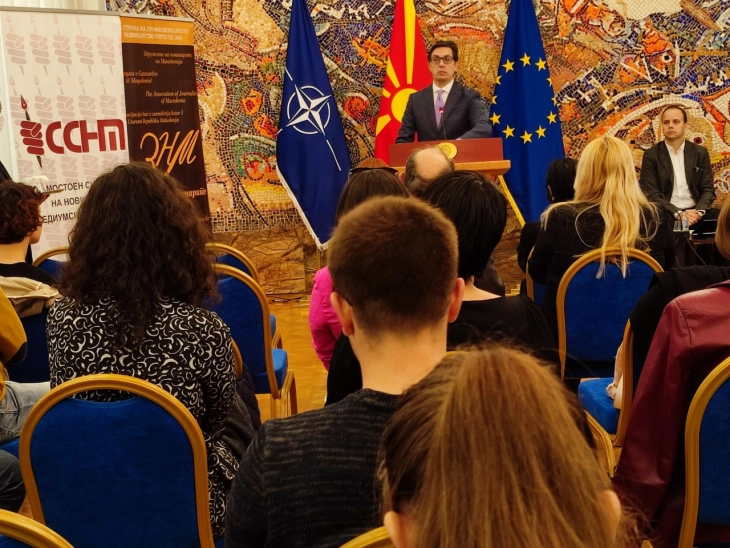World Press Freedom Day: Time for changes that will guarantee freedom for reporters

Skopje, 3 May 2022 (MIA) – World Press Freedom Day is an important reminder for the media outlets' responsibility for transparent and responsible institutions, and regarding media freedom in order to create an ambiance in which they’ll do their work in accordance to professional journalism principles, freed of political and economic pressures, said President Stevo Pendarovski at a panel discussion dedicated to journalists' and media workers' safety, held in honor of May 3, World Press Freedom Day.
“The years of the pandemic and the war in Ukraine showed us how important the work the media does is in securing timely, verified and unbiased information in a time during which we face an ocean of information that harms every democracy. Threatening media worker safety is to threaten media freedom. Intimidation, assault, blackmail, online harassment, gender-based hate speech, discrimination and other forms of pressure make it impossible for media workers to do their jobs,” Pendarovski pointed out.
The President said that he supports the amendments to the Criminal Code initiated by the ZNM, a journalists' organization, and SSNM, media trade union, that would treat attacks against journalists as felonies, prosecuted through official duty with higher fines for the perpetrator.
Pendarovski said that reporters' safety is a common obligation for all, but above all it’s an obligation of the state institutions and political factors.
“We don’t need this as just a politically empty phrase. All state institutions are obligated to enable uninterrupted access to information concerning their work, so that journalists can provide quality information for the citizens. Security and judicial organs should act timely and without being selective in cases where the safety of journalists is threatened. We also need to keep in mind the ZNM report’s statement that despite the lessened number of threats and attacks, journalists still feel unsafe due to the judiciary and prosecution’s inaction in solving these cases in the past,” Pendarovski said.
The President of the Association of Journalists, ZNM, Mladen Chadikovski, said: "The relative freedom in which we live shouldn’t fool us, because without systemic solutions guaranteeing quality media content and independence of the work of editors and journalists, we’ll just be running in circles. It’s time for changes that will guarantee freedom of work, because freedom of speech is hard to come by and it can be easy to lose."
Chadikovski added that the market in our country is small, unattractive, and leaves no room to develop independent journalism, so the media often depends on political or business centers of power. "This is why the quality of media content is sometimes not significant enough, not good enough on a regional level, a local level, and everywhere," Chadikovski added.
“That’s why we have to get our priorities straight, fight against the media oligarchy which is in a polygamous marriage with politics and business. How? A few ways. First, as a profession, we’re united in our request to form an independent national fund to create media content. Professional journalism costs time, effort, thinking, and money. We’ve never whined or asked for state funds, and we won’t start now,” Chadikovski said.
He also pointed out that we need to recognize that there is a lack of good shows, programs, documentaries, educational and investigative stories, because there is a huge need for quality content of local, regional and national media.
“We insist on creating an independent public interest project fund, prioritizing journalists from the inner corners of Macedonia, and young journalists, because we want to stimulate critical and analytical journalism as a precondition to improve society,” Chadikovski pointed out.
The ZNM President said that they’re looking to create conditions for further independence and additional deepening of public service reforms, especially when it comes to modeling the informative program’s significant role.
“It’s not enough to just balance information, we need to promote the national service into an informational leader to raise the entire profession’s standards,” Chadikovski pointed out.
He emphasized that media workers demand self-regulation be accepted as a process.
“I know we’re not without sin, journalism lives in an era full of propaganda and false narratives, but us pros have an obligation to point to those causing trouble in our ranks,” Chadikovski said.
He pointed out that they’re demanding for an urgent adoption of the law that will allow for perpetrators against journalists to be criminally prosecuted. We can no longer wait, Chadikovski said, for all political crises and banal party press conferences to pass in order for the parties to remember that they exist because of the citizens who are usually represented by us journalists. The bill is stuck in Parliament.
“We demand for the legislation, which will make the draconian fines against journalists 4 times smaller, to be adopted, as it’s currently stuck in the legislative house,” Chadikovski said.
He also said that limited media freedom limits the freedom of the citizens.
“I hope that, from today on, we’ll start building a new mentality, which won’t view journalists as punching bags, or to look to them for PR support. PR-journalism has to end, as well as press conferences which don’t allow for questions at the end, debate clubs with no journalists, written press releases by the PR teams of ministries, governments and parties,” the ZNM President concluded. dk/ba/







